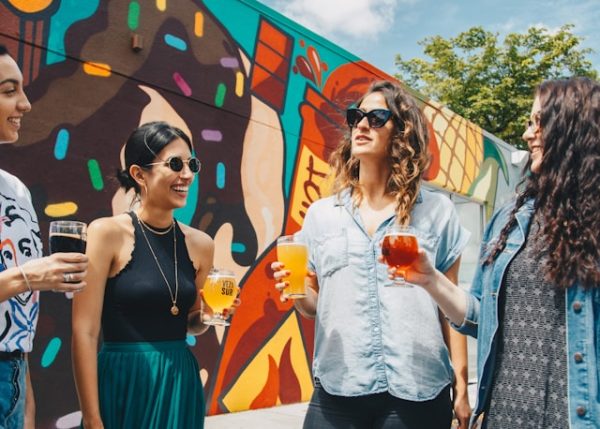
While alcohol is widely socially acceptable, the number of alcohol-related deaths is growing in certain states, including Pennsylvania and New Mexico. Thus, seeking help and freeing yourself from the grip of alcoholism is very important. Still, once you succeed, maintaining sobriety during social gatherings and holidays can be challenging. However, with the right strategies and preparation, you can stay sober and enjoy yourself. Here, we’ll provide practical tips to help you navigate social events and holidays without compromising your sobriety.
Understand Triggers and High-Risk Situations
Understanding your personal triggers is crucial in maintaining sobriety during social gatherings. Triggers can be anything that sparks the desire to drink, such as stress, certain people, or specific environments. It is important to identify these triggers so you can develop strategies to manage or avoid them. Journaling your experiences and emotions can help you pinpoint these triggers and understand patterns in your behavior.

If you have doubts about staying sober, it’s better to stay home and avoid high-risk situations.
High-risk situations are those where the temptation to drink is especially strong. Social gatherings and holidays often fall into this category due to the prevalence of alcohol and the social pressure to join in. Being aware of these situations allows you to prepare and plan accordingly. Recognize events that might pose a risk and decide in advance how you will handle them. For example, plan to stay only briefly or have a trusted friend accompany you for support.
Prioritize Your Sobriety
If you’re fresh out of rehab, it’s best to avoid big triggers and high-risk situations and seek additional support. States like Pennsylvania, where this problem is more prominent, there are more and more quality options you can turn to. Reaching out to prime institutions like Little Creek Recovery Pennsylvania, a well-known addiction treatment center offering sober living programs, can make all the difference. These specialized programs provide a safe space for you to develop the necessary skills for independent living without alcohol. Then, once you’re equipped with the right coping mechanism and you feel ready, you can try attending social gatherings.
Preparation is Key
One of the most effective ways to maintain sobriety during social gatherings is to plan ahead. That involves mentally and emotionally preparing yourself for the event. Think about what might happen and how you will respond. Visualize yourself enjoying the event without drinking. Planning reduces anxiety and increases your confidence in your ability to stay sober.
Setting clear boundaries with friends and family is no less important. Tell them about your commitment to sobriety and what you need from them to support your efforts. Communicate your limits, such as avoiding conversations about alcohol or ensuring there will be non-alcoholic options available. Most people will respect your boundaries if they understand their importance.
Practical Tips for Staying Sober
Being one of the rare people who doesn’t drink at an event can be tough, but having a plan helps. Here are some practical tips to help you stay sober and enjoy your time. Implementing these strategies can make maintaining sobriety more manageable and less stressful.
Have a Support System
Having a support system in place can make a significant difference. It might include friends, family members, or a support group. Let them know about your plans and ask for their support. They can encourage and help you stay sober.

A strong support system is crucial for maintaining sobriety during challenging times.
In situations where you feel pressured, having someone to call or text can be a helpful way to stay grounded. For couples, it’s especially beneficial to understand how you can support each other’s journey to sobriety to maintain mutual encouragement.
Bring Your Own Non-Alcoholic Beverages
One simple but effective strategy is to bring your own non-alcoholic beverages. That ensures you have something to drink that you enjoy and eliminates the need to rely on others for alcohol-free options. Many delicious and sophisticated non-alcoholic drinks are available, from sparkling water to alcohol-free beers and mocktails.
Stay Occupied
Keeping yourself busy and engaged can help you avoid the temptation to drink. Participate in activities and conversations that interest you. Whether helping out in the kitchen, playing games, or engaging in meaningful discussions, staying occupied helps take your mind off drinking and makes the event more enjoyable. Understanding the benefits of being alcohol-free can further reinforce your commitment to sobriety and help you stay focused on your goals.
Use Coping Strategies During the Event
Mindfulness and stress management techniques can help you stay present and calm during social gatherings. Techniques such as deep breathing, meditation, and visualization can reduce stress and anxiety. When you feel overwhelmed, take a few moments to breathe deeply and center yourself. That can help you manage your emotions and stay focused on your sobriety.
Dealing with peer pressure can be one of the most challenging aspects of maintaining sobriety during social events. It’s important to have strategies in place for politely refusing offers of alcohol. Practice saying “no” confidently and have a few reasons prepared for why you’re not drinking. For example, you might say you’re on medication, you’re driving, or you’re focusing on health and wellness. That can help you avoid falling back into and maintain your sobriety.
Reflect and Reward Yourself After the Event
After the event, take some time to reflect on how things went. Consider what strategies worked well and what you might do differently next time. Reflecting on your experiences helps you learn and grow, making it easier to handle similar situations in the future. It’s also an opportunity to recognize and celebrate your success in maintaining sobriety.
Rewarding yourself for maintaining sobriety is an important part of the process. It reinforces your positive behavior and gives you something to look forward to. Choose healthy and meaningful rewards, such as treating yourself to a favorite meal, spending time on a hobby you love, or taking a relaxing day off.
Long-Term Strategies for Sobriety
Maintaining regular communication with your support network is vital for long-term sobriety. Schedule regular check-ins with friends, family, or a support group. These check-ins provide ongoing encouragement and accountability, helping you stay on track. They also offer a chance to discuss challenges and seek advice or support.
According to a Stanford Medicine study, participating in programs like Alcoholics Anonymous (AA) significantly improves the chances of maintaining sobriety. The study highlights that the social support and structured environment provided by AA are crucial for sustaining long-term abstinence. Regular interactions with your support network reinforce these benefits, making navigating the complexities of sobriety easier.

Don’t be afraid to seek help if you feel triggered; it’s all part of maintaining sobriety during social gatherings
Staying informed about sobriety and recovery strategies is important for long-term success. Read books, attend workshops, or join online communities focused on sobriety. Continual learning helps you adapt to new challenges and reinforces your commitment to staying sober. Being proactive in your recovery journey ensures you are always equipped with the latest tools and strategies.
Final Thoughts on Maintaining Sobriety During Social Gatherings and Holidays
Maintaining sobriety during social gatherings and holidays requires preparation, support, and a set of effective strategies. By understanding your triggers, planning, and employing practical tips, you can confidently navigate these events. Remember to reflect on your experiences, reward yourself for your successes, and stay connected with your support network. With these approaches, you can enjoy social events and holidays while staying committed to sobriety.

